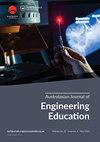Training responsible engineers. Phronesis and the role of virtues in teaching engineering ethics
Q1 Social Sciences
Australasian Journal of Engineering Education
Pub Date : 2021-01-02
DOI:10.1080/22054952.2021.1889086
引用次数: 11
Abstract
ABSTRACT Engineering ethics courses aim to improve students’ ethical competence by developing skills such as ethical sensitivity, awareness, analysis and judgement. We present a type of virtue engineering ethics that bridges the gap between academic knowledge (in both ethics and engineering) and its application in engineering practice (particularly design). To clarify why learning about virtues can enrich students’ ethical thinking and competences, we specifically consider the virtue of practical wisdom, phronesis. At the core of the paper, we put forward a theoretical argument for including phronesis in teaching ethics within innovation courses. Training this virtue will help engineering students in dealing with the various uncertainties that will emerge from their future engineering practices. With regard to implementing our proposal, we suggest to integrate practical wisdom in ‘semi-technical’ courses that combine theoretical in-class learning and practical design experiences. We discuss the structure, aims and assessment methods of an integrated product development course that we deem preferable to and potentially more effective than stand-alone engineering ethics classes. An engineering virtue ethics can help engineering students develop a personal reflective way of thinking about concrete courses of action in engineering practice, and may have beneficial ripple effects on their lives, society and the environment.培养负责任的工程师。工程伦理学教学中美德的作用
工程伦理课程旨在通过培养学生的伦理敏感性、伦理意识、伦理分析和伦理判断能力,提高学生的伦理能力。我们提出了一种美德工程伦理,它弥合了学术知识(伦理学和工程学)与其在工程实践(特别是设计)中的应用之间的差距。为了阐明为什么学习美德可以丰富学生的伦理思维和能力,我们特别考虑了实践智慧的美德,即实践智慧。本文的核心内容是在创新课程中引入实践道德教学的理论论证。培养这种美德将有助于工科学生处理未来工程实践中出现的各种不确定性。在实施方案方面,我们建议在“半技术”课程中融入实践智慧,将课堂上的理论学习与实际设计经验相结合。我们讨论了集成产品开发课程的结构、目标和评估方法,我们认为集成产品开发课程比独立的工程伦理课程更可取,也可能更有效。工程美德伦理可以帮助工科学生在工程实践中形成一种个人反思的方式来思考具体的行动过程,并可能对他们的生活、社会和环境产生有益的连锁反应。
本文章由计算机程序翻译,如有差异,请以英文原文为准。
求助全文
约1分钟内获得全文
求助全文
来源期刊

Australasian Journal of Engineering Education
Social Sciences-Education
CiteScore
6.40
自引率
0.00%
发文量
8
 求助内容:
求助内容: 应助结果提醒方式:
应助结果提醒方式:


